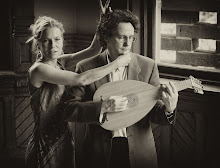
Last Wednesday afternoon had us doing a lecture-demonstration in a common room with comfy chairs for the last class of a graduate seminar led by Prof. Deanne Williams. Her seminar on Early Modern Girlhood and David Goldstein's class, some of which were also there, had been looking at Milton's Comus.
Comus was written to celebrate the appointment of John Egerton, the Earl of Bridgewater's appointment as Lord President of Wales and was Milton's first big gig. He was recommended for the job of writing the book by Egerton's household musician, Henry Lawes.
Milton's dad (also John) was a part-time composer though his day jobs were scrivener, a kind of notary, and investor. His music was published in two fairly prestigious prints. There's one piece in The Triumphs of Oriana, a set of madrigals about how great Elizabeth I is and there are a few in a book called Teares and Lamentacions of a Sorrowful Soule which is for broken consort and voices. These books have music in by Byrd, Morley, Dowland, Ferrabosco and lots of other famous composers, so he was in good company. There are manuscript pieces by Milton the Elder on sacred subjects as well. There's no good editions of any of his music really, and the only recording of some of the manuscript pieces and a couple of the consort songs use a boys choir when they are certainly 'domestic sacred music' for singing at home one on a part.
The younger Milton wrote a big Latin poem to his dad when the old man was letting the boy sit around the house reading for five years after getting an MA. (How many bourgeois dads would stand for that?) In the poem he says Ipse volens Phœbus se dispertire duobus,/Altera dona mihi, dedit altera dona parenti,/Dividuumque Deum genitorque puerque tenemus. (Phoebus wished to divide himself, and gave one half of himself to me and the other half to you. Father and son, we share between us the god.)
We discussed this and looked at the disposition of some the scores comparing the old fashioned Teares and Lamentacions print to the up-to-date scoring of Sweet Echo from Comus. We used Milton's poem commending Lawes to think about what criteria the new style that was emerging was to be judged by then we got as quickly as we could onto saucy love songs.
Comus, celebrates chastity, but a number of the songs that Henry Lawes says he wrote for Lady Alice Egerton (who sang Sweet Echo in the masque) and her sisters are pretty racy. For example Psuedo-Donne's Sweet stay awhile (which would fit into the Romeo and Juliet consummation scene), Waller's Go Lovely Rose and others. We also sang songs by Lawes brother William on poems by Herrick (including How Lillies Came White; quite saucy), a Lanier setting of Carew's obscene poem on the Marigold and finished with downright vulgar songs with words by Thomas Durfey. Durfey was good pals with Chas. II and the song above song is a Health to His Majesty. When you read during this Canadian election campaign that political discourse has gone downhill think about this song that has 'Tories guard the king/let Whigs in halters swing'. Whiggish peers are accused of rape and the prime minister is mocked for being crippled. Rabid anti-Catholic perjurer Titus Oates is accused of buggery, but this is probably true since he was kicked out of the navy for gross indecency. Read this to get a sense of how binge drinking becomes a political statement in the 1660s. We also sang a ballad song from a collection by Durfey with Benny Hill style humour about a young lady rejecting various tradesmens' advances.
No wonder Milton closeted himself up to write Paradise Lost after the Restoration.


1 comment:
Invest in Ripple on eToro the World’s Best Social Trading Network.
Join millions who have already discovered better methods for investing in Ripple...
Learn from experienced eToro traders or copy their positions automatically!
Post a Comment